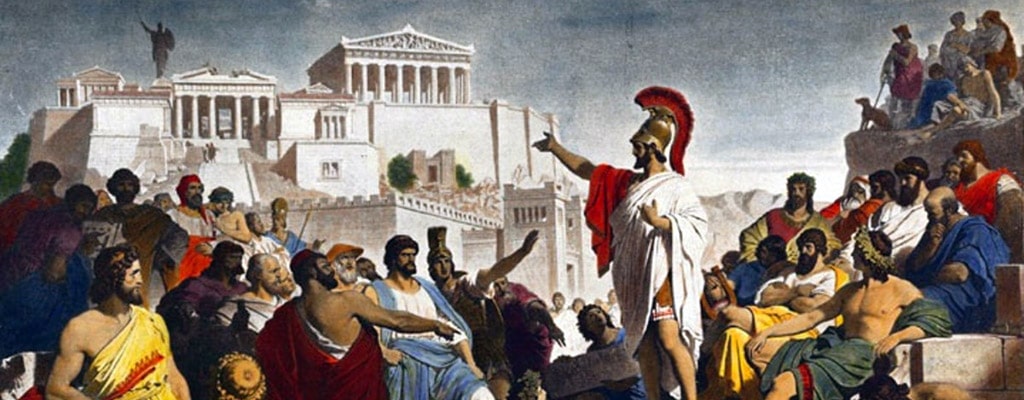“Great deeds are usually wrought at great risks.” – Herodotus, Histories
Herodotus is the most famous ancient Greek historian also known by most scolars as “The Father of History”. Herodotus was born in Halicarnassus, and lived in the fifth century BC. Herodotus was different than previous historians in several ways. He would carefully collect and then critically review all his materials, before he would arrange them into a historical narrative. The only work we know that he produced was the Histories, which is a record of his “inquiry” (or historia in Greek, a word that passed into Latin and acquired its modern meaning of “history”), being an investigation of the origins and a recounting of the wars between the Greeks and the Persians which includes a wealth of historical, geographical and ethnographical information. Although some of the stories Herodotus recounts were inaccurate, he states that he is reporting only what was told to him and he was most often than not, correct in his information. Despite Herodotus’ historical significance, little is known of his personal life. The Histories is generally regarded as a masterpiece of non-fiction by most scolars to this day.
For more information on Herodotus please check Wikipedia, Herodotus

Thucydides
Thucydides was a historian, political philosopher, and general. He was born in Athens c. 460 and died c. 400 BC. His History of the Peloponnesian War describes the war between Sparta and Athens until the year 411 BC. As compared to Herodotus (who’s called the Father of History) Thucydides has been dubbed the father of “scientific history” because of his strict standards of evidence-gathering and analysis of cause and effect without any references to hearsay or intervention by the gods.
Thucydides is also considered to be the father of the school of political realism, which views the political behavior of individuals and the subsequent outcome of relations between states as ultimately mediated by and constructed upon the emotions of fear and self-interest. His historical accounts are studied at both universities and advanced military colleges worldwide tot his day. The Melian dialogue remains a seminal work of international relations theory while Pericles’ Funeral Oration is widely studied in political theory, history, and classical studies.
Thucydides showed an interest in developing an understanding of human nature to explain behaviour in such crises as plague, massacres, and civil war.
For more information on Thucidydes please check Wikipedia, Thucidydes

Xenophon
Xenophon was a Greek historian, soldier, mercenary, and student of Socrates. He was born in Athens c. 430 and died in or around 354 BC. Xenophon is known for writing about the history of his own times, the late 5th and early 4th centuries BC, especially for his account of the final years of the Peloponnesian War. His Hellenica is considered to be the continuation of Thucydides’ History of the Peloponnesian War. However, his most famous work, Anabasis, was based on his youthful participation in the failed campaign of Cyrus the Younger to claim the Persian throne.
Xenophon affiliated himself with Sparta for most of his life, despite being born in Athens. His pro-oligarchic views, service under Spartan generals in the Persian campaign, as well as his friendship with King Agesilaus II endeared Xenophon to the Spartans, and them to him. A number of his writings display his pro-Spartan bias and admiration, especially Agesilaus and Constitution of Sparta. Xenophon, along with Plato, are the most important authorities on Socrates’ work and life. Xenophon himself was Socrates’ sudent when he was a young man. Because of his admiration towards his teacher, and well after Socrates’ death in 399 BC, Xenophon wrote several Socratic dialogues, including an Apology concerning the events of Socrates’ trial and death.
Xenophon’s works are written in very uncomplicated Attic Greek and they cover a wide range of genres. Xenophon’s works are among the first that many students of Ancient Greek translate on account of the straightforward and succinct nature of his writings. Diogenes Laertius states in his Lives of Eminent Philosophers that Xenophon was sometimes known as the “Attic Muse” for the sweetness of his diction.
For more information on Xenophon please check Wikipedia, Xenophon
Xenophon's Anabasis - Book I
An Excerpt from Xenophon’s Anabasis
Darius and Parysatis had two sons: the elder was named Artaxerxes, and the younger Cyrus. Now, as Darius lay sick and felt that the end of life drew near, he wished both his sons to be with him. The elder, as it chanced, was already there, but Cyrus he must needs send for from the province over which he had made him satrap, having appointed him general moreover of all the forces that muster in the plain of the Castolus. Thus Cyrus went up, taking with him Tissaphernes as his friend, and accompanied also by a body of Hellenes, three hundred heavy-armed men, under the command of Xenias the Parrhasian1.
Source: The University of Adelaide, EBooks. Read Xenophon’s Anabasis online here

